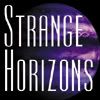"The lords were due any day, and the house was in a turmoil preparing to receive them. Already their gifts had been arriving for her: a milk-white falcon bred in the wild peaks of Osterland from the Lord of Hel; a brooch like a gold wafer from Map Hwillion, who was too poor to afford such things; a flute of polished wood inlaid with silver, which bore no name, and worried Raederle, since whoever had sent it had known what she would love." --Heir of Sea and Fire by Patricia McKillip
Scenes scripted so lusciously are what attracts me to Patricia McKillip's writing. I return to her tales again and again. She is one of the few authors who rarely ever disappoints, and yet maintains a prolific publishing schedule that I greatly envy. I was introduced to McKillip's fantasies by Alphabet of Thorns. I stumbled upon it one day at a bookshop. The cover, a dense and alluring painting by Kinuko Craft caught my eye. Yes, I admit, I do judge books by their covers. At least, I do when I am in a bookshop. When presented with so many thousands of bindings, I think it is the only way that I can navigate the selection. After all, a publisher, a marketing division, and sometimes (if very lucky) the author herself has made a deliberate choice in how the book will appear. If the marketing does not appeal to me, I will generally pass by. This process can be curtailed, however, if I am struck by the title. I love good titles, and I couldn't resist one like Alphabet of Thorns. So, I picked it up. I read the first page. I was immediately transported to a world where magic flowed freely and language had mystical properties. As a philologist I find magical languages fascinating, and McKillip's language featured very heavily (as one might expect from the title) in that particular book. As was my habit in those days, but thankfully is no longer, I began to purchase every McKillip book I could. Now, upon our shelves at home, I have a large and rather unwieldy stack of her novels. I decided this year that I would invest my fantasy reading in McKillip alone, at least until I'd made a dent in that pile. If you take a moment and look over at our Book List on the right side of the screen, you will see that I have finished four McKillip novels thus far this year, and the quote at the top of this entry is from a fifth that I began last night.
Of the four books that I have recently read, I was most impressed with the very, very short, nearly novella-length, novel: The Changeling Sea. What I am struck so powerfully by is McKillip's ability to blend fantastic elements in a way that is neither clunky nor frivolous. She dips into world mythology, into fantasy-history, and into what seems an infinite well of creativity when it pertains to the workings and workers of magic. I am, as those who know me well will attest, a lover of wizardry and wizards. No one write wizards and their magic better than Patricia McKillip. She has a way with spellcraft that leaves me, for lack of a better term, spellbound. But, there is much more to her writing than that. Her characters are vibrant. Their dialogues are keen, engaging, and never superfluous. Female characters feature boldly in her stories, and are usually actors rather than victims or sidekicks. Alphabet of Thorns for example has two main, powerful, female characters. The Changeling Sea's narrator and protagonist is a young woman, as is the central character in The Forgotten Beasts of Eld. Concerning the books that I have read this year, only the Riddle-Master of Hed didn't have a central female character. But, alas, that is only one of that particular book's problems. I give my highest recommendation to The Changeling Sea, but would also praise The Forgotten Beasts of Eld. I found both books more than satisfactory. They were truly delightful. The Book of Atrix Wolfe was good, but it suffered from some stagnant passages, and the lengthy and difficult silence of its main female character. Still, I enjoyed it. Riddle-Master of Hed, however, was my first disappointment from McKillip. I am under the impression that it was written early in career, for it lacks the elegance of the works that first caught my attention. I found the language to be puerile, the characters lacking in dimension, and even the beautiful descriptive passages which I think McKillip is a master of to be paltry in comparison to the lushness of works like Alphabet of Thorns. It took me significantly longer to read Riddle-Master than any previous McKillip work. Riddle-Master is also the only trilogy of McKillip's that I am aware of. All of her other books, as far as I know, are stand-alone novels. The sequel to Riddle-Master, Heir of Sea and Fire, which I featured in the paragraph at the top of this entry, has begun with greater potential than its predecessor. I hope it continues to.



No comments:
Post a Comment